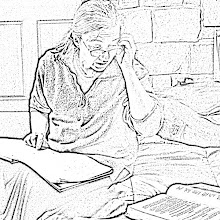Manifest Destiny. The Treaty of Guadalupe. Hidalgo. Battle of Brandywine.
I was flipping through the eleventh grade American History textbook recently – the one I’d started teaching from and then set aside – when these words in bold text caught my eye. I felt waves of panic. I wasn’t teaching any of these to Jacob. What was I doing to my son? Was I cheating him out of a thorough coverage of American history? Was he going to end up deficient if he couldn’t spew out facts from history like the multiplication table?
You see, I’d started teaching him out of that textbook, but assigned him a biography to supplement the text. One biography led to another, and I began to follow American history via people’s lives, not battles and treaties and dates, assigning Jacob book after book about George Washington, Lewis and Clark, Abraham Lincoln...
“I’d rather read the books,” Jacob had told me, and I sympathized. A gripping biography stays with you, the personalities and adventures burned into your memory like the plot of some spellbinding novel. I understood so much more about the Cultural Revolution in China by reading the autobiographical Life and Death in Shanghai by Nien Cheng than I ever got out of any textbook. I came to love history not because of textbooks, but because of biographies and autobiographies. History came alive through books like that.
So when Jacob came to me last week with book in hand and said, “Do you have a minute?” then proceeded to read from Commander in Chief: Abraham Lincoln and the Civil War by Albert Marrin, I knew I’d hit another absorbing account of history.
“Listen to this,” he said.
“Although Abraham had left the woods long ago, in many ways he remained a child of the frontier. His homespun manners annoyed [his wife] to no end. Often he answered the door in his stocking feet or came to meals in his shirtsleeves, unheard of in ‘proper’ households, where men wore jackets in the hottest weather. He would lie on the hallway floor, his back propped against an overturned chair, reading newspapers aloud; that way, he explained, he could absorb an article with his eyes and ears. If guests arrived while Mary was dressing, he called out, ‘She will be down as soon as she has all her trotting harness on.’
Abraham’s jokes embarrassed his wife. She never knew whether he might say the wrong thing at the wrong time… [Once] he saw a well-dressed woman slip in a muddy street. ‘Reminds me of a duck,’ he piped up. ‘Feathers on her head and down on her behind.’”
Jacob shared snatches about Abe’s wife Mary, her high-strung nature, her episodes of smashing dishes, screaming, throwing books at Abe, hitting him with a broom, or hurling potatoes at his head.
Now that you won’t find in a typical textbook.
Perhaps I’m not cheating Jacob after all, but enriching him.
Sunday, February 15, 2009
Am I cheating my child out of an education in American history?
Subscribe to:
Post Comments (Atom)
“What we have done for ourselves alone dies with us; what we have done for others and the world remains and is immortal.”— Albert Pike, Scottish Rite Freemason (1809-1891)



6 comments:
You are NOT cheating him. It's GREAT to accentuate the STORY in history. That's what makes it personal and makes it stick.
Wonderful! I'd like to invite you to join Homeschool History Buffs carnival at http://www.thetiethatbindsus.blogspot.com
Thank you for entering this in the carnival!!!!!! The carnival will be up Monday, don't forget to stop by. : )
Cheating...NO!
I think that it is wonderful.
My boy would like the same.
I'm off to order some from the library. Thanks!
I love what you are doing with your son!!! I, too, "hated" history in school. I didn't learn to love history until I had my daughter... and I started reading children's books to her... ESPECIALLY biographies. We love reading biographies! I think it is the most fascinating way to discover history! Enjoy!
This is a great post. I have been homeschooling for over 16 years and many times during the years I have thought these same types of thoughts(am I doing enough,what about this etc.) My daughter graduated from homeschool and is a wonderful functioning part of society and has excelled in many areas in her life. So I know that all is well and will turn out just fine for mys son as well. Marie
Post a Comment